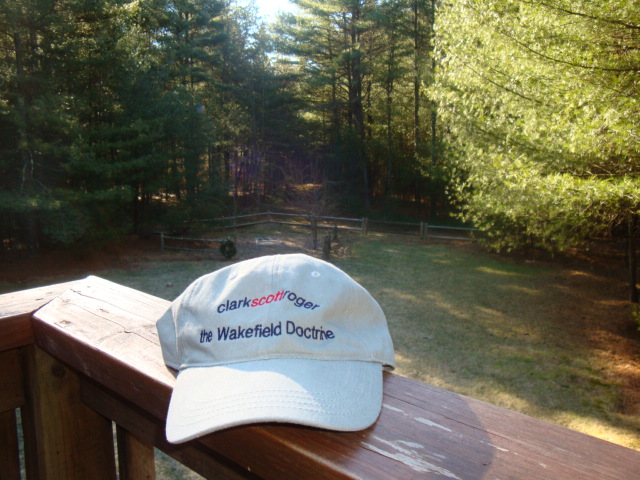Welcome to the Wakefield Doctrine (the theory of clarks, scotts and rogers)
heading out the door, the weather is cool (in style not necessarily Fahrenheit) southeast wind.
(Just scanned the post below… think I need to reread it later today. Let us know your thoughts…)
*
Friday -the Wakefield Doctrine- ‘of clarks and Autumn, weather and the tyranny of the mind’
November 2, 2018Welcome to the Wakefield Doctrine (the theory of clarks, scotts and rogers)
My second-favorite type of weather totally has me looking up the live version of Robin Trower doing ‘Bridge of Sighs’. Hold on….. all set!
Where was I?
First the weather: darker than it needs to be for 6:30 in the morning, even in pre-time change November. Windy. (For those not familiar with our location, we’re surrounded by a pine woods. As such, the wind acquires an aural presence that is most impressive. Not only do you hear the blowing, you can hear it roaming. The distant approach through the needle-ladened branches grows louder and closer, then it veers off in another direction). Very cool. And the temperature is 69 degrees with the hint of rain. ‘Wuthering Heights’ weather fer sure.
…in any event. Recently I’ve had occasion to talk to people about the Doctrine, (yeah, lol, really!), and the topic has been centered on the question, ‘Well, it sounds all sorts of interesting, but has it done you any good?”
The answer is ‘Yes* and Yes!’
Damn! Running out of time!
Hey! You’re all Readers (‘Readers’ motto: ‘I’m here of my own free will, I get this Doctrine thing. Sorta. No, mostly. Whatta got for us today?’) So I’ll skip right to the answer*.
The Wakefield Doctrine has served as an aide in my attempts to identify with others. With other clarks and, here’s an interesting-discover-something-as-one-writes, with scotts and rogers. Identifying with clarks will tempt some to say, ‘well, duh!’ The thing is, through identification, I’m in a position to share the experiences as well as the knowledge (of others).
So, with clarks, that I know and/or encounter out in the world, I root for their success and I will cringe as they proceed down a path that I may have already travelled to find disappointment or set-back. In this, the magic of identification reveals itself. I feel for the clark who is about to double-down on hope for a future that is based on a false premise; I smile in a shared-joy when I see a clark avoid a no-win encounter with a roger (or a scott). But mostly, and this is something I’ve learned is a benefit for rogers and scotts as well, I learn about myself. And that changes me.
When I see a clark descend into the dark, as all clarks (and I’m learning, some rogers and scotts) must, I feel hope for their return. And that….that! is where the benefit of the Doctrine stands out. I see a clark come up out of the dark. Not only do I know how they feel, I know that they survived. (And the true power of this ‘dark place’ is that it is the dominion of unchallengeable negativity. When caught in its embrace, there is only one voice and it brooks no resistance.)
Knowing that other clarks (and rogers and scotts) have been through this experience and come out the other side does not mean I can defeat the argument of complete nihilism. It does not. What it does do is make the power of the dark less…. all-powerful, all-encompassing. In a word, a perspective of hope.
* this single asterisk stands in for both references: the qualification to my first ‘Yes’ and the inclusion of background information for the benefit of any New Readers.
The Wakefield Doctrine is a perspective on the world, life and the people who populate it (both known, unknown, real and/or imagined). The premise of this ‘theory of personality’ is that we, all of us, are born with the potential to experience the world as having one of three distinct characters: the reality of the Outsider(clarks), the world of the Predator(scotts) and the life of the Herd Member(rogers). At a very early age, for reasons not yet understood, we settle into one of these three, where we grow and develop strategies and styles of interacting, aka personality.
The Wakefield Doctrine looks at personality types as the reflection of the world being experienced by the individual. Not a series of answers on a multiple choice test.
I have fairly poor posture, a tendency to mumble when speaking, a taste for the fringe and a ravenous, near-insatiable curiosity because those are representative of my best efforts to contend with, survive and thrive in the personal reality of the Outsider. A scott exhibits different behavior (yeah, that was for comedic effect…lol) but the fact is, the style of interaction that identifies a scott or a roger tells you about the world they are relating themselves to.
(btw, important: we have one and only one predominant worldview. we never lose the potential to experience the world as do ‘the other two’. This explains why at certain times (usually times of duress) we might exhibit behavior and interests not typical of type.)
*










